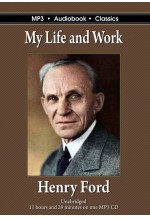Henry Ford
|
Henry Ford (July 30, 1863 – April 7, 1947) was an American industrialist who founded the Ford Motor Company. He was born the eldest of five on a farm in Michigan. He married Clara Bryant in 1888 and had one child, Edsel Ford, who succeeded his father as president of Ford in 1918. He apprenticed as a machinist and then worked for Westinghouse and Edison as an engineer. He met Thomas Edison, who encouraged his experiments with gasoline engines and automobiles. He founded the Ford Motor Company in 1903. The Model T was introduced in 1908 supported by a huge publicity campaign. An inexpensive car that was simple to drive and easy to repair, it went on to sell 15 million units. By 1918 half of all the cars in America were Model T’s. Ford was an inventor and innovator, earning 161 U.S. patents. Assembly line technology lowered costs and made the cars affordable to an emerging middle class. Paying top wages attracted the best workers, reduced turnover and enabled workers to buy the cars they made. Selling through independent dealerships cut selling expenses and made the dealers rich. The company was multinational, with ten subsidiaries on six continents selling a third of the world’s automobiles by 1932. The hallmarks of the company’s were often called “Fordism” and seen as a symbol of American culture. Ford staunchly opposed labor unions, believing that labor leaders sought to restrict productivity gains to protect jobs. He capitulated only when a strike in 1941 brought things to a head. Ford threatened to close down but capitulated when his wife threatened to leave if he ruined the family business. The Ford Motor Company was a vital government supplier during wartime, but Ford opposed war, thinking it wasteful. During World War I he supported Woodrow Wilson and the League of Nations. He believed that wars were encouraged by greedy financiers, mostly Jewish, who profited handsomely from conflict. During the 1920’s the company sponsored of the Dearborn Independent, a weekly paper that regularly published anti-Semitic articles. A libel suit in 1927 generated controversy that led to Ford’s denying any knowledge of the material, closing the paper and recanting his views in a public letter to the Anti-Defamation League. Ford resumed control of Ford Motor Company after Edsel died in 1943. He turned the company over to his grandson Henry Ford II in 1945 and died in 1947. Much of his wealth went to establish the Ford Foundation. The Ford family continues to control the Ford Motor Company today. |
My Life and Work
"My Life and Work" is an autobiography written by Henry Ford in conjunction with Samuel Crowther and..
$11.99


